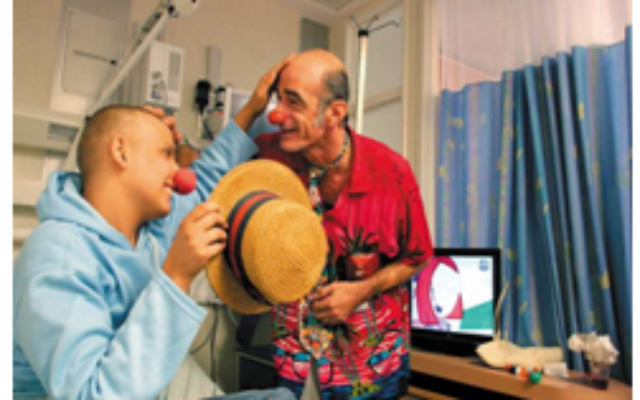Hadassah Sends in the Medical Clowns
Laughter might not be the best medicine, but it's definitely good medicine.

Hadassah Hospital has a medical clown program in the belief that laughter is important, if not necessarily the best, medicine.
Clown care has existed for decades as a way to help ill children, but the discipline has been formalized and is now considered an invaluable asset in pediatrics.
Israel has become a global leader in the field. Thanks to the generosity of donors, Hadassah has pioneered this tool for healing through humor.
Hadassah’s clown program began in September 2002, and it was the first of its kind in Israel. Clowns are present in the pediatric inpatient and intensive care units, outpatient clinics, acute-care waiting rooms, and physical therapy, bone marrow transplant, burn and pediatric AIDS units, reminding young patients that they are more than just their illness.
The program began at Ein Kerem and quickly spread to the Mount Scopus campus.
Working with the hospital’s medical staff, Hadassah’s clowns communicate with the hospital’s acutely and chronically ill children, their parents and the medical staff. Reintroducing fun and laughter as natural parts of everyday life, they help ease the stress of illness.
Hadassah’s renowned medical clowns use their skills to treat children with doses of fun to help them deal with the emotions they may experience in the hospital, such as fear, anxiety, loneliness and boredom.
They wonder drug of laughter reduces pain by relaxing patients and helping children cope with difficult situations.
The clowns are all trained professionals. Along with their professional qualifications, Chris, Jerome, Dudi, Talia, Bobo, Rinat and all the other clowns share an intense empathy with children.
“I look into a child’s eyes and see the person, not the illness,” Jerome said. “I don’t even think about the illness until I’ve left the hospital.”
According to the pediatrics division at Hadassah-Ein Kerem, “The hospital clowns have made an extraordinary impact on the pediatrics division. They help acutely ill children lose their fear of hospitalization and treatment, and they forge a deep connection with the chronically sick youngsters, even those who are withdrawn and remote. Once the clowns reach them, it opens the way for the medical staff to do so as well. For all our youngsters, the clowns turn the hospital experience into something pleasurable. They create a joyous atmosphere in which everyone is smiling.”
Hadassah has set the professional criteria for medical clowning in Israel. The clowns’ presence is viewed by the medical crew as a natural part of hospital work. The nurses and doctors use the assistance of the clowns in medical procedures ranging from simple blood tests to the escorting of children to operating rooms, from physiotherapy to HIV treatment and emergency actions.
The professional collaboration has become a cornerstone that has led to positive results for patients and their families, both of whom benefit from this service at the hospital.
Laughter, like exercise, can reduce stress, improve tolerance to pain, and alter bodily functions such as blood pressure, heart rate, muscle activity and stomach acidity. The mere presence of the clown is a reminder of joy and hope in rooms of fear and sickness.
A clown in the hospital is itself a joke, the very spirit of humor. Laughter triggers the release of endorphins and serotonin, which are the feel-good hormones that create feelings of euphoria, love and happiness.
Laughter also works through a psychological phenomenon known as “facial feedback,” whereby pulling a certain expression can cause you to experience the corresponding emotion. In other words, the simple act of smiling can lift your mood.
Clowns also give sick children a sense of control. Unlike medical staff, who come and go based on the procedural timetable, Hadassah’s clowns stay with a child only if invited, allowing hospitalized youngsters to decide what they want.



comments